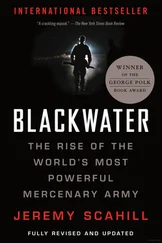“Saleh knew how to survive,” said Dr. Emile Nakhleh, a former senior CIA intelligence officer. During his decades in power, had Saleh “learned how to speak the language of the Cold War, to endear himself to us and other Western countries by speaking the anti-communist language.” After 9/11, Saleh “learned very quickly” that he had to speak the antiterrorism language, Nakhleh added.
“So he came here seeking support, seeking financing. But, Saleh, from day one, years back, never thought that terrorism posed a threat to him. He thought that Yemen was basically a platform for al Qaeda and other terrorist organizations and that the real target was al Saud, the House of Saud. So he found ways to deal with them,” Nakhleh told me. “And yet, he would come here or speak to us in a language we would like and would understand, but then he would go home and do all kinds of alliances with all kinds of shady characters to help him survive. I don’t think he really honestly believed that al Qaeda posed a serious threat to his regime.”
Colonel Lang said Bush “was so taken with President Saleh as a personable, friendly, chummy kind of guy, that Bush was in fact quite willing to listen to whatever Saleh said about, ‘We like you Americans, we want to help you, we want to cooperate with you,’ that kind of business, and was quite willing to send them foreign aid, including military aid.” During his meeting with President Bush in November 2001, Saleh “expressed his concern and hope that the military action in Afghanistan does not exceed its borders and spread to other parts of the Middle East, igniting further instability in the region,” according to a statement issued by the Yemeni Embassy in Washington at the end of the visit. But to keep Yemen off Washington’s target list, Saleh would have to take action. Or at least give the appearance of doing so.
Saleh’s entourage was given a list of several al Qaeda suspects that the Yemeni regime could target as a show of good faith. The next month, Saleh ordered his forces to raid a village in Marib Province, where Abu Ali al Harithi, a lead suspect in the Cole bombing, and other militants were believed to be residing. The operation by Yemeni special forces was a categorical failure. Local tribesmen took several of the soldiers hostage and the targets of the raid allegedly escaped unharmed. The soldiers were later released through tribal mediators, but the action angered the tribes and served as a warning to Saleh to stay out of Marib. It was the beginning of what would be a complex and dangerous chess match for Saleh as he made his first moves to satisfy Washington’s desire for targeted killing in Yemen while maintaining his own hold on power.
Soon after Saleh’s Washington meetings, the United States established a task force for the Horn of Africa and Gulf of Aden. In late 2002, some nine hundred military and intelligence personnel would be deployed to a former French military outpost, Camp Lemonnier, in Djibouti, under the name Combined Joint Task Force–Horn of Africa (CJTF–HOA). Located just an hour from Yemen by boat, the secretive base would soon serve as a command center for covert US action in the Horn of Africa and the Arabian Peninsula and would serve as the launch pad for the CIA and JSOC to strike at will outside the declared battlefield of Afghanistan.
As construction began on Lemonnier, the United States beefed up the presence of military “trainers” inside Yemen. Although officially in Yemen to modernize Yemen’s counterterrorism forces, the Americans quickly set out to establish operational capacity to track al Qaeda suspects to find and fix their location so that US forces could finish them off. “Over the years, there’d been a number of kinds of people that were dubious characters from the American point of view that had taken shelter in Yemen. And Saleh plays his own game, very much, so he variously offers people shelter and a place to refuge,” recalled Colonel Lang. “So it was known that there were people in the country who were inimical to the United States, and they started tracking where these people were.” A year after Saleh’s meeting with Bush at the White House, the US “trainers” would set up their first “wet” operation.

5. The Enigma of Anwar Awlaki
THE UNITED KINGDOM, THE UNITED STATES AND YEMEN, 2002–2003—When Anwar Awlaki arrived in the United Kingdom, he called his wealthy uncle, Sheikh Saleh bin Fareed, who had a home in the south of England. “Uncle Saleh, I am here. May I come and see you?” Anwar asked. “You are welcome,” bin Fareed told him. When Anwar arrived at his uncle’s home, the two caught up on family affairs back in Yemen before the conversation turned to the events in the United States. “Do you have anything to do with what happened?” bin Fareed recalled asking him, knowing that Anwar had been interrogated multiple times by the FBI. He had also seen news reports alleging that Anwar had met with some of the hijackers. “I don’t have anything [to do with 9/11], whatsoever,” Anwar said, according to his uncle. “If I had anything to do with al Qaeda or those people, I would not be sitting with you in England today. I travel freely. In the UK they do not touch me.” Anwar told his uncle that US agents had told him, “We have nothing against you.” Anwar stayed with his uncle while he got situated in England and began preaching before Muslim audiences, at community groups, religious centers and mosques, with an increasing degree of passion, if not militancy, about the importance of defending and promoting Islam at a moment when he believed it was under assault. “He used to commute by train—he’d go to London, and he’d go to Birmingham, to give speeches, and he’d come back,” bin Fareed recalled.
In a speech he delivered during this period at the annual conference of the charity JIMAS, an Arabic acronym for the Association to Revive the Way of the Messenger, at the University of Leicester, Awlaki issued a challenge to Western Muslims to defend and preach their faith. “We should be concerned about what is happening to our neighbors, to our friends, to our coworkers, to the people whom we live with,” he said. “We’re not being concerned if we know that our neighbors and friends, their fate is hellfire and we’re doing nothing about it. So our first role as a Muslim minority of Muslims living among non-Muslims, is to proclaim the message publicly, and when we convey the message, we convey it in very plain and clear terms, with no confusion.” He cautioned them not to be aggressive in promoting Islam, saying they should be like UPS, DHL or FedEx delivery people. “Rather than knocking on the door with a hammer, and then when the person opens the door you throw the package in their face—no,” he said. “You knock on the door, very politely, and then when they open the door you have a big smile on your face.”
In mid-2002, Awlaki returned to Yemen to study at the famed Iman University in Sana’a. “I was given permission from the administration of the University…to attend any class at any level and I took advantage of this and attended classes in Tafsir [exegesis of the Koran] and Fiqh [Islamic jurisprudence] for a period of a few months,” Awlaki later wrote, adding that he “also benefited from the teachings of Shaykh Abdul Majid al Zindani the Rector of the University.” But as Awlaki began to make his next moves, those investigating him in the United States had not forgotten about him.
While Awlaki traveled to Saudi Arabia and Yemen and studied Islam, back in the United States there were some within the US intelligence community who believed that his case should not have been closed, that the young imam was potentially connected to 9/11 and that all leads on him had not been pursued. Some believed he should not have been allowed to leave the United States. “When he left town, it was as if the air went out of the balloon,” said one FBI source. Yet, according to the 9/11 Commission, the investigation into Awlaki’s alleged involvement with the 9/11 hijackers did not produce evidence that “was considered strong enough to support a criminal prosecution.”
Читать дальше













